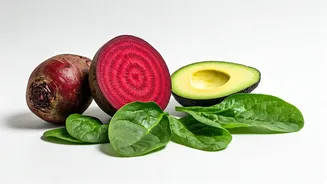Superfoods Explained
The journey to controlling cholesterol often begins with the right diet. Certain foods stand out for their ability to positively impact cholesterol levels,
and understanding how they work is crucial. This article focuses on three such superfoods. These foods can influence cholesterol in different ways, from lowering LDL (bad) cholesterol to increasing HDL (good) cholesterol. The key is knowing which foods to choose and how to prepare them to maximize their benefits. This approach encourages a proactive way to manage your health through nutrition. It is recommended to choose a variety of foods, not just the ones mentioned here, to get a range of nutrients. Always consult a healthcare professional before making significant changes to your diet, especially if you have existing health conditions. This will ensure that the changes you make are safe and suitable for your specific needs. This article aims to provide a useful starting point for anyone looking to improve their cholesterol management through diet.
Oats and Cholesterol
Oats are a well-known ally in the fight against high cholesterol. They are rich in soluble fiber, particularly beta-glucan. This type of fiber works by binding with cholesterol in the digestive system, preventing its absorption into the bloodstream. When you eat oats, the beta-glucan forms a gel-like substance that captures cholesterol. This process reduces the overall amount of cholesterol that gets absorbed and helps lower LDL cholesterol levels. For optimal results, consume at least 3 grams of soluble fiber from oats daily. This can be easily achieved by including a serving of oatmeal in your breakfast. You can enjoy oats in many ways; prepare them as porridge, add them to smoothies, or use them in baked goods. However, to maximize their impact, it is essential to prepare oats correctly and avoid adding ingredients that might counteract their cholesterol-lowering effects. Be mindful of additives like excessive sugar or saturated fats, which may negate the benefits. For example, choose steel-cut oats, which are less processed and have more fiber than instant oats. Start gradually if you are not used to eating a lot of fiber to avoid any digestive discomfort. Making oats a regular part of your diet can be a simple yet effective step toward better cholesterol management.
The Power of Nuts
Nuts are another group of superfoods that offer substantial benefits for cholesterol management. A variety of nuts, including almonds, walnuts, and cashews, can help improve cholesterol profiles. These nuts are packed with unsaturated fats, fiber, and plant sterols, all of which contribute to lowering LDL cholesterol. Unsaturated fats, unlike saturated fats, do not raise cholesterol levels and can even help reduce them. Fiber in nuts aids in the digestion process, helping to remove cholesterol from the body. Plant sterols, also found in nuts, block the absorption of cholesterol in the intestines. Regular consumption of nuts, about a handful daily, has been linked to a reduction in LDL cholesterol. However, it's crucial to consume nuts in moderation. Nuts are calorie-dense, and overeating them could lead to weight gain. Consider choosing raw or dry-roasted nuts instead of those with added salt or sugar. You can add nuts to salads, cereals, or enjoy them as a snack. Adding nuts to your daily routine not only helps manage cholesterol but also provides other essential nutrients. Remember to include a variety of nuts to gain a range of nutrients and diversify your diet for better overall health.
Avocados for Health
Avocados have gained significant attention for their potential health benefits, including cholesterol management. These creamy fruits are rich in monounsaturated fats, which are beneficial for reducing LDL cholesterol and increasing HDL cholesterol. Monounsaturated fats are heart-healthy fats that can improve overall cholesterol levels. In addition, avocados are a good source of fiber, aiding in the reduction of cholesterol absorption in the gut. The fiber in avocados helps to sweep away cholesterol before it enters the bloodstream, promoting healthier arteries. They also contain plant sterols, which further contribute to blocking cholesterol absorption. Studies have shown that including avocados in your diet can significantly improve your cholesterol profile. You can eat avocados in various ways—add them to salads, use them in sandwiches, or blend them into smoothies. The key is to consume them regularly as part of a balanced diet. Avocados are also nutrient-dense, providing essential vitamins and minerals, which can improve your overall health. By incorporating avocados, you are making a delicious and effective choice for managing your cholesterol levels. Make sure to integrate avocados as part of a varied and balanced diet for the best results, ensuring you also include other cholesterol-friendly foods.












